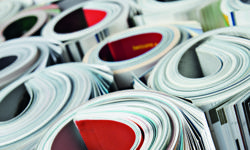Whenever circulation and marketing directors get together to discuss the development of their business in Europe, the conversation invariably finds its way to Germany. Not surprising really … with Europe’s largest population of over 82 million, its strongest economy and one of the most dynamic press markets, expectations are always high. Many publishers rightly place the German market at the top of their list of potential sells in Europe.
In spite of a difficult period since 2002 with unemployment at a record high, (11.8% or 5 million people out of work), economic growth almost at a standstill, and a high budget deficit (over the 3% level imposed by the EU), Germany still has one of the strongest and most impressive economies in the world:
* No 1 exporting nation in the world
* No 2 importing nation
* No 3 economy
* Over ¼ of the total GDP of the EU
Moreover, use of English is widespread and purchasing power is high (average income €3,500 per month). So why don’t international titles sell more in Germany?
Hard times for the German press
The IVW (the German equivalent of ABC) recorded a total average circulation in 2005 of 126 million copies sold. Subscriptions accounted for 57 million copies with 52 million single copy sales. However, sales of German consumer magazines have dropped by 6.9% since last year. Sales of international titles in Germany are down by 8.7%. Dailies and news magazines have been hit the hardest by these decreases. Germany’s biggest selling daily, Bild, lost over 105,000 sales, which is 2.7% of its 3.76 million circulation. Stern and Der Spiegel both lost 1% of their sales.
Competition from the internet, satellite TV, free newspapers, the poor economy and reduced purchasing power are widely blamed for this but lack of confidence in the future is often quoted as the main reason for consumer hesitation. When times are hard, Germans tend to watch their savings closely until better times come around. Now that Germany, at last, has a central government, perhaps this will release a little more optimism and stimulate more confident purchasing!
Growing sectors in the domestic press are women’s and men’s magazines and special interest titles. Youth, TV and business publications are in decline. International titles mirror these trends.
This has triggered off a wave of special offers of books, CDs, DVDs and even holidays through the biggest national titles. Originating from Italy and Spain, these ‘secondary products’ have boosted circulation revenues at a time when many national titles were seeing reduced advertising revenues, with some even threatened with closure. Suddeutsche Zeitung was the first national daily to start its own book collection in May 2004, selling over 10 million books, 70,000 CDs and 20,000 DVDs! Die Zeit’s ambitions go even further with plans to obtain over one third of its total turnover from ‘secondary products’ by the year 2010.
The total market share of imported press into Germany is barely 1.5% in spite of there being over 3,500 titles available. There are 7.3 million foreign residents in Germany (of which 2 million are Turkish ‘Gastarbeiter’ now into their third generation), with more recent arrivals coming from the former Yugoslavia and Eastern Europe. The number of UK residents in Germany is relatively modest by comparison, but Germany has a wealth of international companies which use English as the main language spoken.
Using the right supply chain
There are over 116,000 outlets in Germany supplied by almost 100 wholesalers. Most of these are family owned companies and, in many regions, have a monopoly over all press products through their designated areas. Some cities, like Berlin and Frankfurt, have two wholesalers covering pre-agreed sectors. Some are partly owned by the four big German publishing groups - Axel Springer, Gruner and Jahr, Bauer and Burda. As wholesale turnover has been in decline over the last four years there is a trend towards more wholesale company mergers.
The retail network is also seeing important (and sometimes controversial) developments as more and more bakeries, petrol stations and even low-cost discount supermarkets are starting to sell press products. These are often TV guides and low cost women’s magazines which sometimes by-pass the traditional wholesaler circuit and sell directly to the supermarkets.
The total number of outlets carrying international press is no more than 4,000 (although, in reality, this is more like 2,500 outlets, as petrol stations carrying single copies of US men’s magazines count as international press outlets). But, by far the most important selling points for the international press are the 400 key travel points in the top 20 cities in Germany. These include 14 airports and most of the mainline railway stations, the most important being Frankfurt, Berlin, Munich and Düsseldorf. 80 different companies operate these outlets with the main chains belonging to the Swiss group Valora (230 k-Kiosks) and the French group Hachette (HDS) with 62 Relay outlets (including Frankfort Airport). These outlets account for over half the sales of international press in Germany. Most of them are open 90 hours per week, 365 days a year and offer the widest selection of titles on sale.
Yet, for most non-German titles, access to the wholesale and retail chains starts with an importer or national distributor. This is an extra link in the supply chain but essential for publishers who do not have a full-time operation in Germany where they can supply directly to each wholesaler as well as carry out themselves the complicated sales administration involved. Unlike many of the other European markets, in Germany, there is a lot of choice. Most of the German publishing groups now offer 3rd party distribution and billing to foreign publishers as well as marketing, promotion and inspection services. They are all highly competitive and allow each publisher to adapt his strategy to the segment of the market he wants to reach. However, they are costly and charge an average of 50% commission on every copy sold (over 41% of which they immediately pass on to the wholesalers and retailers). The biggest importers and national distributors of international press are Saarbach, Axel Springer Verlag, IPS and Gruner and Jahr with smaller companies like PMV taking a more selective share of the market.
The international market
Full access to the German market for international titles is neither possible nor desirable for most publishers. Very few publications go to more than 2,000 outlets and tend to concentrate their activities on the main travel point outlets as described earlier. Segmentation and concentration is important to avoid massive investment in high-waste promotions and the costly transport of unsolds. With 46% average sales efficiency, (compared to 65% for the domestic press) international titles suffer from low revenue, low awareness and are therefore low priority for most wholesalers in Germany who are continually pushing for increased commissions on non-German publications.
Special covers, local editions and theme-based promotions are often the best way to (temporarily) win over a wholesaler and allow him to see the full potential sales of one of his lesser know titles. The national distributors are a key element here as they often use their own sales managers or reps to liaise between publisher and wholesaler.
For optimum value the focus should be on the 8 to 10 biggest cities in Germany, (Hamburg, Berlin, Frankfurt, Munich, Düsseldorf, Cologne, Stuttgart and Hanover). University cities like Heidelberg, Tuebingen and Munster also possess important pockets of English speakers with gigantic campuses and internationally orientated courses. However, the market is limited to the top 20 cities.
How many times have we heard the comment: "I don’t have to learn German, because everyone in Germany speaks English"? Whereas many young, professional and international people speak good English, this has not always been the case and, especially with some wholesalers and retailers, fluent use of English is by no means a certainty. The use of German-speaking representatives is important here. Most of the national distributors offer these services and some local publishing houses even have freelance trade representatives. These are usually the most effective of all investments in developing sales in Germany as the constant battle for availability and visibility is fought at wholesale and retail level.
The most effective promotions are usually those that raise visibility (counter displays, posters, shelf talkers, shop displays) enabling your title to stand out from the thousands of other titles. They are expensive through the main chains but can still be negotiated individually with certain retail outlets.
Segmentation is also essential in direct marketing activities with an abundance of local lists available but with high rental costs and low response rates. The language filter is important with surprisingly few international publishers communicating in German. List brokers usually recommend the over-used international lists which, at least, have the benefit of having generated response in the past for foreign titles selling into Germany.
Local subscription agents are good collectors of names and offer direct marketing services in German through their regional sales teams. Many of them operate on a catalogue basis to public offices, administrations or schools and universities.
The strength of the German press market and the wide choice of titles on offer make it more difficult for foreign titles to penetrate. The creative element is very important. A smart line or witty phrase used in a UK campaign does not guarantee instance success when rolled out in Germany! Humour is different in every country as many of the references which produce the punchline are based on local culture, history or even popular TV shows. Many times at the Economist we have had to create a separate campaign just for the German market!
FEATURE
Losing in Germany?
Despite the huge size of the German market and our close economic ties, UK publishers (in common with other international publishers) consistently underachieve there. The Economist’s Philip Kucharski looks at the challenges of marketing international titles in Germany.










